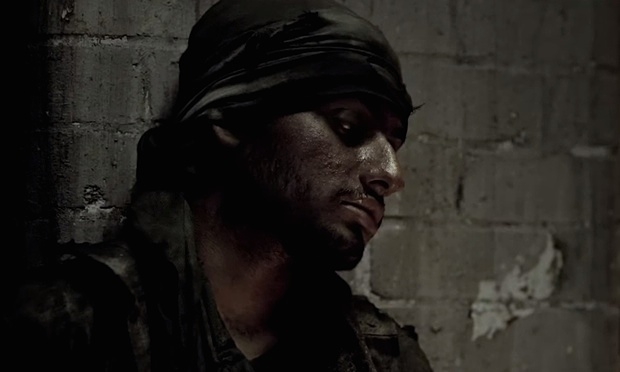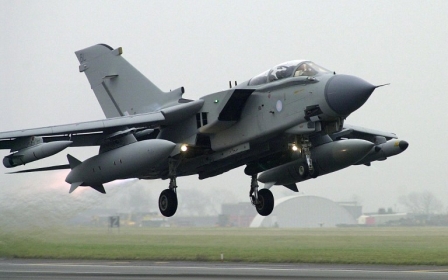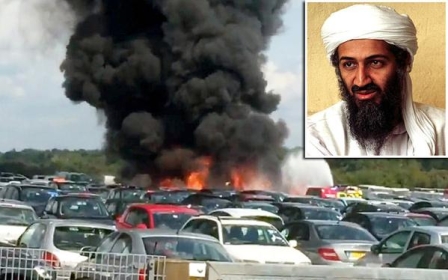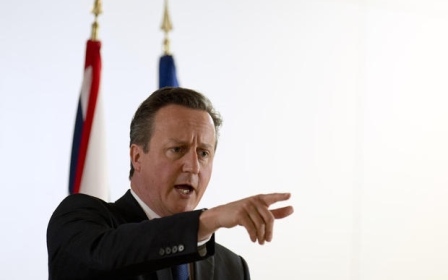UK counter-extremism group launch campaign to counter IS propaganda

A counter extremism think tank in the United Kingdom has launched an online campaign aimed at promoting counter narratives to combat the lure of the Islamic State (IS) group to British Muslims.
The Quilliam Foundation revealed on Monday that is behind a recently released video that profiles a young British man who has joined IS and is fighting in Syria.
In the three minute clip the man is sitting, injured, reading a letter from his older brother who apologises for having unwittingly contributed to his joining IS and who pleads for the young Briton to return home.
A statement accompanying the video urges people to share it as an act of rejecting IS and its narrative.
“[IS] are radicalising our brothers to fight in Syria. They are tearing families apart. Enough is enough. Sharing this film will show [IS] that their extremist views have no place in our community. No family should lose another loved one to such hatred.”
The video forms part of Quilliam’s #NotAnotherBrother campaign, which aims to tackle extremism in the UK on a civil society level. The Twitter hashtag has had 432 tweets since its initiation last month, according to the monitoring website Topsy.
The video was partly inspired by the organisation’s wider work on analysing and combatting IS propaganda, which was extensively profiled by Quilliam’s Charlie Winter in a report published earlier this year.
Jonathan Russell, Quilliam’s political liaison officer, told Middle East Eye that the target for the video are people who may be drawn into the IS net.
“It’s targeted at people who may be vulnerable to radicalisation – not necessarily the jihadists themselves – but people who may buy in to, at some level, grievances that are taken up by jihadists subsequently,” he said. “One particular target market is non-violent Islamists.”
“It is also aimed at broader UK civil society to try and get them to mobilise to make videos like this and push back with a much broader message which is that we are not going to defeat ISIL simply by bombing them or locking people up,” he added, using an alternative acronym for IS.
“By doing this we may be able to safeguard young people from radicalisation and integrate people better into British life.”
Russell said the video was initially posted online two weeks ago and has since received over 600 views. He claimed that it is reaching Quilliam’s target market but added that it is difficult to monitor where the views are coming from because of how easy it is to maintain anonymity on the internet.
The video’s initial launch was done without Quilliam branding, which Russell said was done to reach a wider range of people.
“We didn’t want it initially to go out just to Quilliam supporters and to people who get their news from mainstream media,” he said. “It was taken up by people who I imagine would never tweet anything from Quilliam.”
Russell said that prominent British Muslims Asghar Bukhari (founding member of the Muslim Public Affairs Committee), Yvonne Ridley (a widely published journalist), and Mohammed Shafiq (chief executive of the Ramadhan Foundation) all shared the video in the first two weeks.
All three have been publicly critical of Quilliam’s approach to counter-extremism work, accusing the organisation and its co-founder Maajid Nawaz of demonising Muslims and failing to properly acknowledge the negative role they believe British foreign policy plays in the radicalisation process.
“They clearly liked the video and felt inspired by it,” Russell said. ““That was the value in not marketing it as Quilliam.”
“The aim was not to be duplicitous, the aim is to understand that in counter narratives there’s a message and a messenger – and in the first phase we decided the messenger was better not to be Quilliam.”
However, Ridley said that Russell was being “misleading” by saying she had shared the video.
“They sent it to me on Twitter and I contacted them asking them who they are and who was funding them because it was a slick production,” she said.
“I was suspicious of it because something didn't ring true. It was too slick to have been knocked up by some amateurs.”
“They [Quilliam] are right about one thing. Quilliam has no credibility in the Muslim community so it would've been treated with a barge pole's distance if it had been credited to them. These sort of silly stunts just make them look even more shadowy.”
The video was produced in conjunction with London-based strategic communications agency Verbalisation, whose team include military experts and former intelligence officers, according to a report in the Daily Telegraph.
The prospect of Quilliam’s target audience – British Muslims vulnerable to radicalisation – being suspicious of former members of the military and intelligence services being involved in producing the video was dismissed by Russell as being a red herring.
“The video can only be viewed as having been made by ex-military men, as much as it can be viewed as having been made by ex-Islamists as well,” he said, referencing the backgrounds of several staff at Quilliam, including former Hizb ut-Tahrir member Maajid Nawaz.
“I don’t think the backgrounds of the people who made the video is the most important thing here.”
Senior intelligence officials have estimated that up to 500 Britons may have joined IS. The former head of counter-terrorism at MI6, Richard Barrett, has reported that up to 300 Britons may have returned home from fighting with the group, with there being concerns that these people may pose a risk of carrying out terrorist attacks in the UK.
Middle East Eye propose une couverture et une analyse indépendantes et incomparables du Moyen-Orient, de l’Afrique du Nord et d’autres régions du monde. Pour en savoir plus sur la reprise de ce contenu et les frais qui s’appliquent, veuillez remplir ce formulaire [en anglais]. Pour en savoir plus sur MEE, cliquez ici [en anglais].




